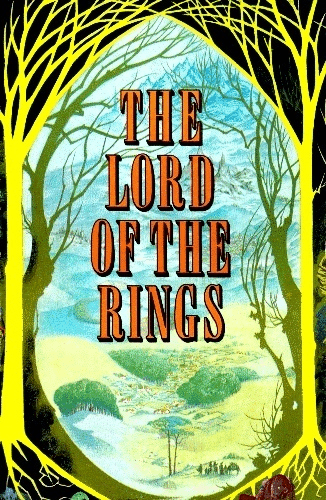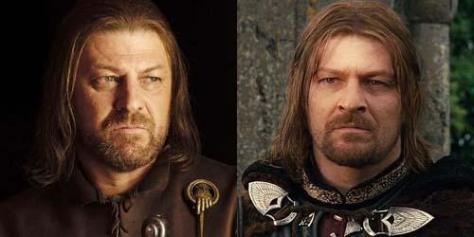The short answer, of course, is when it’s not written by JRR Tolkien. Now I should make it clear that I am not talking about the movies in any way, we can all agree they are a perfectly valid adaptation of The Lord of the Rings’ books, Peter Jackson has the rights to prove it and everything. I want to talk in this post about the countless of authors, and countless of books, that over the years have been inspired by The Lord of the Rings.

The cover of my (very nearly dead) copy of The Lord of the Rings
Now JRR Tolkien is by no means the first author to have written what can be described as ‘a life’s work’ or ‘magnum opus’. That honour belongs maybe to Homerus (or Homer, as the English-speakers call him), or some Egyptian with a very strong arm (from chipping out all those hieroglyphs, geddit). What JRR Tolkien did was write an era-defining, genre-defining (probably even genre-creating) work of fiction that influenced a generation of young kids who then became the authors we love (not just authors, of course, I think it took the internet and social media to create the first generation wherein everyone is an author of some kind, but that’s an aside), as well as influencing several generations after it, present and future included.
There are of course the obvious influences, like David Eddings, Steven Erikson, basically any epic fantasy writer. It is easy to see how these authors have been influenced not only by the story structure (i.e. person finds out they are special, goes on quest, hijinks ensue, thingamabob is used to destroy ultimate evil, the whole world breathes a sigh of relief), but also the rich and fantastical world creation of Tolkien. Then there are some authors who take the world-building, and create a different kind of story (hello, Laura Lam), or take the story structure and transpose it into our world (Wesley Chu, maybe? I can’t think). Then there are authors like Stephen King, George RR Martin, and Scott Lynch, who do something that is similar yet completely different.
I am currently reading the Dark Tower series, which is what influenced this whole post in the first place. At the start of every book in the series (at least the edition I’m reading) there is a little intro by King, talking about being 19 and wanting to create his own Lord of the Rings (mixed with a Western, say thankya). Yet there is nothing about the Dark Tower series that seems to relate to Tolkien’s vision. Yes, there is a tower, and yes, there is a big evil with a big eye (of sorts). And yes, there is a ‘hero’ seeking the tower. But Roland Deschain is not really a hero, not in the Tolkien sense. He murders, a lot, and isn’t that good at making friends, let alone keeping them. The world is somewhere between a complete fantasy world and ours, with elements of both thrown together (I’m trying not to be specific so I don’t spoil anything). And, most importantly, it doesn’t feel at all like The Lord of the Rings. Everyone is at least a little good, a little evil, and a lot screwed up. Right and wrong is not so clear-cut. The lines between reality and fantasy get quite blurred a few books in (book 6 oh em gee go Stephen). I’m sure people who hate The Lord of the Rings could still enjoy the Dark Tower series.
The same can be said of the world Scott Lynch has created for Locke Lamora and the Gentleman Bastards. From their name alone you can tell they won’t be squeaky-clean heroes. The world is pure fantasy, but there’s science more than there is magic, and tricks more than there are actual illusions. It’s gritty and real and immersive in a completely different way from Stephen King, from Tolkien, from anyone else. The same goes for Westeros, which has often been described as Middle Earth with added boobies and swearing. It’s got more political intrigue, more shady characters, more murders, more dragons, and more kick-ass girl assassins than Tolkien could ever had contemplated. And most importantly of all, it has its own unique voice.

OK, so Westeros and Middle Earth do have something in common…
Now, this might seem fairly obvious. No writer writes like any other writer. And I’m sure you could argue that the straight-forward epic fantasy examples I’ve mentioned are also completely different from the world of Tolkien. But my point, as far as I still remember that I had one, is that the best writers don’t try to deny their influences, they don’t try and hide the fact that their work was inspired by the previous generation, and they don’t try to copy it. By appreciating it for what it is, by letting it be its own thing, and by going so deep into appreciating the story that they sort of mind-meld with the writerly ghost of Tolkien himself, they can create something that is wholly their own, and therefore wholly different.
So don’t be afraid to read in the genre you write in. Don’t be afraid to read outside it either, read whatever you want. As long as you commit yourself to making something that is wholly unique, wholly you, and always aim to become a better writer, no matter where you are in your career, there is no fear of you being accused of reusing plots or copying others. You don’t avoid such things by avoiding reading, you avoid it by reading deeply and understanding as much as you can about the writers that have gone before you.
P.S. Sorry it took me a while to get this post out (which I promised to be ‘coming soon’ in my last post), and that it’s not more coherent or more directly related to The Lord of the Rings. I’ll aim to be better next time.